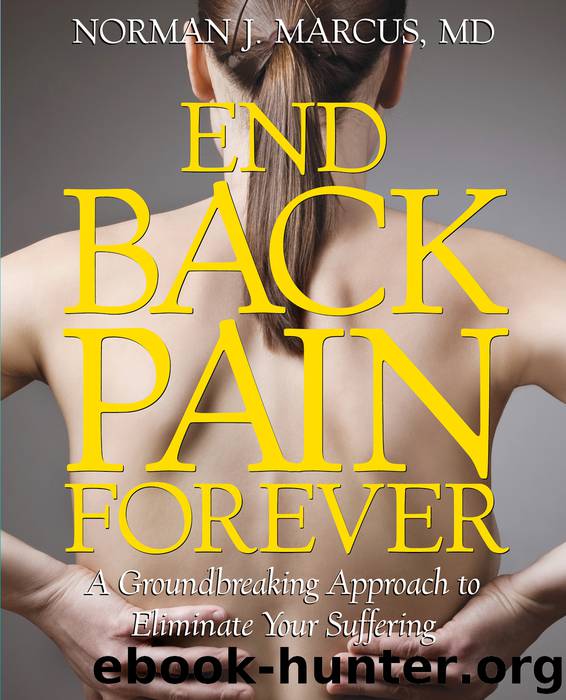End Back Pain Forever by Norman J. Marcus

Author:Norman J. Marcus
Language: eng
Format: epub
Publisher: Atria Books
BACK PAIN AFTER PREGNANCY
Women with a history of low back pain are more likely to have back pain during and after pregnancy. Even though back pain can persist after delivery, it usually improves for most women by the third month postpartum. After that, more women continue to report major reductions in pain, but after six months, the numbers appear to level off. Even so, if you still have back pain, do not despair. Why? Because women who are not free of pain at six months will continue to report the disappearance of pain over time, with improvement reported as late as four years after giving birth. Studies of women treated for back pain during pregnancy reveal that those at high risk for back pain are no more likely to suffer back pain than low-risk women, provided that they are informed about the risk and learn to exercise properly.
All the successful studies of the benefits of exercise in new mothers provided individualized exercises slowly over a long period of time to address the specific pain and needs of each mother. This was in contrast to failed studies, where all of the new mothers received the same exercise programs. Also, the studies showed that being evaluated prior to starting exercise and being observed at least every one to two weeks resulted in a better chance of success. The bottom line is that your chance of success with exercise is best with more supervision, frequency, intensity, and with a greater duration for the program that you participate in.
However, the best type of exercise has not yet been determined. Weak muscles appear to be associated not only with back pain but also with the inability to control urine and feces. Postpartum incontinence has been shown to be reduced by as much as 50 percent with exercises to strengthen the pelvic floor, such as squeezing the muscles in the region of the vagina and rectum. In contrast, teaching exercises to women who had no low back pain before and during pregnancy had no effect on whether or not they suffered persistent postpartum low back pain. In this group, it seems that alterations in ligaments and joint position associated with pregnancy may outweigh any muscle contributions to the pain. In the months following delivery, when hormones and ligaments return to baseline conditions, their pain will be gone in most cases.
The bottom line is that you will probably have back pain during and/or after your pregnancy, but you can minimize its frequency and/or intensity by understanding and paying attention to what causes the pain. Get in the habit of exercising and remaining trim before pregnancy, and once you are pregnant, modify your activities to minimize those things that will produce low back pain, and learn exercises that you can continue to do as your pregnancy progresses.
Download
This site does not store any files on its server. We only index and link to content provided by other sites. Please contact the content providers to delete copyright contents if any and email us, we'll remove relevant links or contents immediately.
Men In Love by Nancy Friday(4342)
Everything Happens for a Reason by Kate Bowler(4076)
The Immortal Life of Henrietta Lacks by Rebecca Skloot(3834)
Why We Sleep by Matthew Walker(3782)
The Sports Rules Book by Human Kinetics(3597)
Not a Diet Book by James Smith(2744)
The Emperor of All Maladies: A Biography of Cancer by Siddhartha Mukherjee(2440)
Sapiens and Homo Deus by Yuval Noah Harari(2424)
Day by Elie Wiesel(2251)
Endless Forms Most Beautiful by Sean B. Carroll(2089)
Angels in America by Tony Kushner(2054)
A Burst of Light by Audre Lorde(1984)
Hashimoto's Protocol by Izabella Wentz PharmD(1903)
Dirty Genes by Ben Lynch(1863)
Reservoir 13 by Jon McGregor(1859)
Stretching to Stay Young by Jessica Matthews(1719)
Fat for Fuel by Joseph Mercola(1701)
The Immune System Recovery Plan by Susan Blum(1700)
Boost Your Brain Power in 60 Seconds by Michelle Schoffro Cook(1681)
